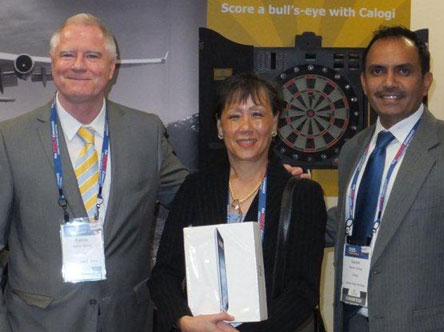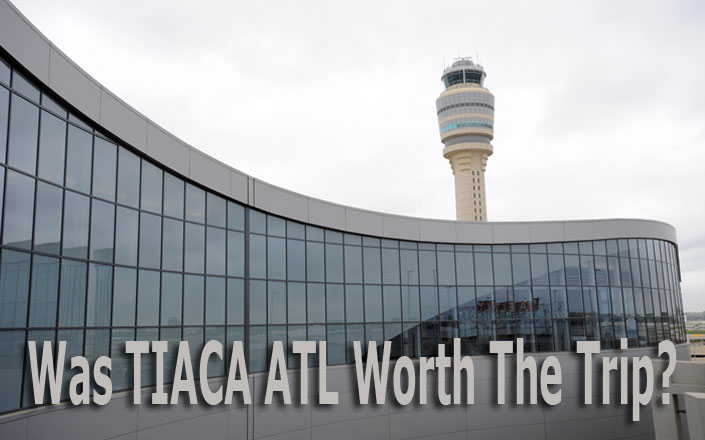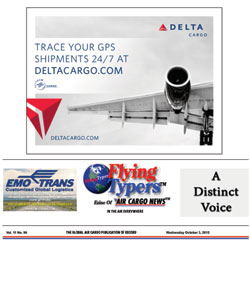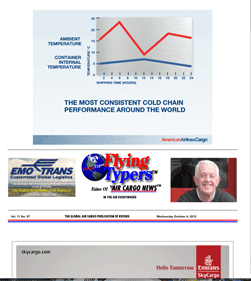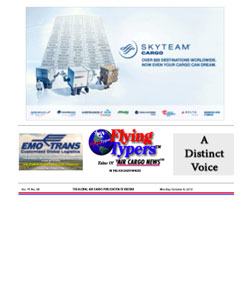 |
 |
|
| |
||
|
Vol. 11 No. 99 Wednesday October 10, 2012 |
|
|
It’s a trade show…It’s
an iPad. |
“e-Commerce
in the air cargo supply chain is another area that
is currently underexploited.
“Everyone wants
to move to an e-commerce environment, but it appears
that taking (and investing in) the first step is the
barrier.
“As a result our
industry is still fragmented, steeped in paper, and
bearing a significant amount of costs due to current
manual processes.
“I believe that
many systems providers need to re-evaluate their place
in the supply chain.
“There needs to
be greater collaboration between the providers to
turn messaging platforms into trading platforms and
yes, this will take investment.
“Looking ahead,
I believe that we will continue to see the number
of airlines reduce as more consolidations take place.
“This will be
driven by the passenger business, but will have economies
of scale for cargo.
“I think we will
also see the same in the forwarder business; expansion
by acquisition is a cost-effective means of quickly
gaining access to new markets.
“Many businesses
now have programs to attract SME customers, recognizing
that these consumers still represent a large portion
of the market.
“I think that
some airlines and GSAs will recognize this and will
look at how they can do business with this group of
stakeholders by allowing them access to their stock
and controlling the financial risk.
“This move will
help to increase yields.
“Many airlines
and forwarders will also look at various ways in which
they can distribute their products through the usage
of cost-effective e-commerce solutions.
“There will be
a push by some to remove many of the outdated manual
processes that still beleaguer our industry.
“Over the next
few years, this push could be the difference between
having a profitable and non-profitable cargo organization.
“The solution
providers will meanwhile be under pressure to control
their costs and to ensure that they offer the best
value for money.
“E-commerce platform
suppliers now need to view themselves as business
partners to the industry stakeholders.
“Cargo Security
is slightly more tricky to foresee.
“I believe that
there will be pressure on various governments to recognize
each other’s known shipper programs and we should
see more bilateral recognition over the next few years.
“The airline will
continue to be held responsible for reporting details
of a shipment—data that can only be supplied
by the shipper.
“Once again, this
comes down to de-fragmentizing our industry and ensuring
the requisite data is available upon demand to those
that need it.
“So it is up to
the solution providers to work closely together to
ensure seamless integration.
“Ask how we keep
CALOGI profitable during these times and the answer
is that we have simple edicts:
“Keep it cost
effective and charge what the market will bear.
“Make money by
increasing volumes, rather than prices.
“Listen to your
customers, develop it once, and make it available
to the community.
“As part of our
international roll out, we are developing additional
features for each community.
“These can subsequently
be re-used by our existing subscribers at no extra
cost.
“Given the expansion
in our home market, we expect to see some growth here,
but our focus is on the international markets.
“I mentioned earlier
that solutions providers need to view themselves as
business partners rather than suppliers and this is
where we want to position ourselves.
“We have devised
a program whereby we will absorb some of the costs
if a customer is willing to partner with us to expand
our network.
“For instance,
if an airline or GSA is willing to support our worldwide
roll out by subscribing to a branded version of the
portal, we will offer free messaging for shipments
executed through the portal.
“It’s a
real win-win situation and a great bonus for SMEs
who wish to have a web presence, global reach, and
a great deal.
“We fully support
the e-AWB and it comes as part of the package. We
have several companies who are particularly interested
in this feature and we anticipate that it will help
boost our penetration.
“We even have an e-AWB solution for the
ground handling companies."
Geoffrey/Flossie
The
show must go on and by gosh, it did! The airline-centric
world came together for its ritualistic, self-celebratory
event that takes place every two years. The over-the-top
closing ceremony actually had representatives of
the last ten Air Cargo Forum hosts, including the
present ones, passing a symbolic torch along, Olympic-style,
in chronological order. All is well at TIACA, 2014
is all set for Seoul Incheon, and 2016 is scheduled
for Paris.
|
If
You Missed Any Of The Previous 3 Issues Of FlyingTypers
|
|||||
|
|||||
FT100312 |
FT100812 |
||||
|---|---|---|---|---|---|
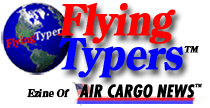

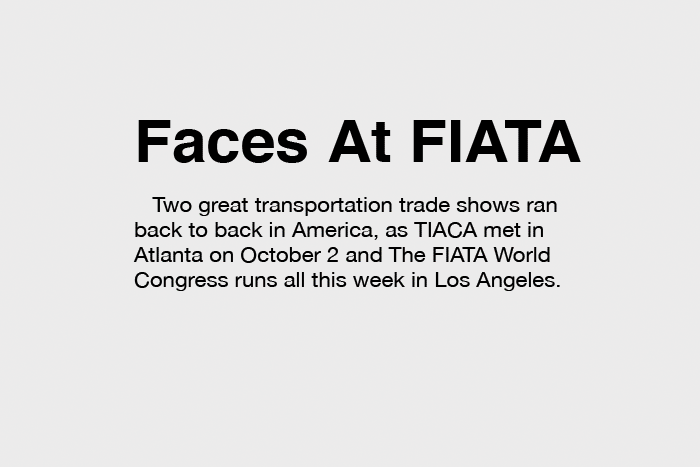
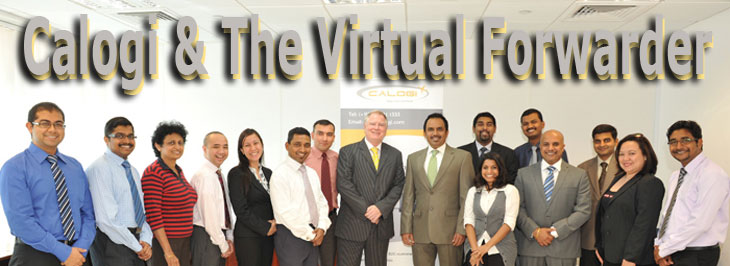
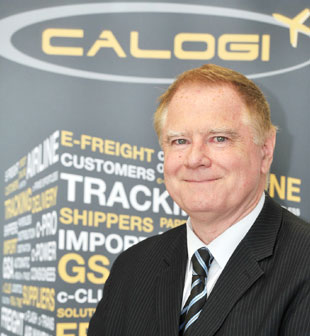 Patrick
Murray, Head of Calogi Worldwide Cargo Distribution,
is spending all this week in Los Angeles at the big
FIATA Annual Conference (Stand 56), “visiting
a potential client base of 750 people, many from developing
countries which are still looking to join the IT future.”
He talks about innovation and building fast-growing
Calogi with great enthusiasm and hope.
Patrick
Murray, Head of Calogi Worldwide Cargo Distribution,
is spending all this week in Los Angeles at the big
FIATA Annual Conference (Stand 56), “visiting
a potential client base of 750 people, many from developing
countries which are still looking to join the IT future.”
He talks about innovation and building fast-growing
Calogi with great enthusiasm and hope.